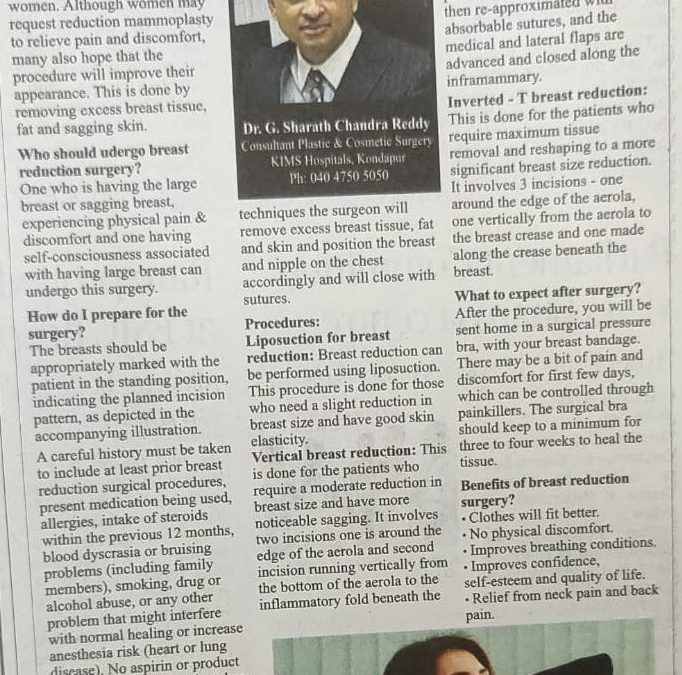What is breast reduction surgery?
Heavy, pendulous breasts are often a source of chronic pain and discomfort for many women. Although women may request reduced mammoplasty to relieve pain and discomfort, many also hope that the procedure will improve their appearance. This is done by removing excess breast tissue, fat, and sagging skin.
Who should undergo breast reduction surgery?
One who is having a large breast or sagging breast, experiencing physical pain & discomfort and one having self-consciousness associated with having a large breast can undergo this surgery.
How do I prepare for the surgery?
The breasts should be appropriately marked with the patient in the standing position, indicating the planned incision pattern, as depicted in the accompanying illustration. A careful history must be taken to include at least prior breast reduction surgical procedures, present medication being used, allergies, intake of steroids within the previous 12 months, blood dyscrasia or bruising problems (including family members), smoking, drug or abuse, or any other with normal healing or increase problem that might interfere anesthesia risk (heart or lung disease). No aspirin or product containing aspirin is to be taken within 2 weeks prior to and following surgery. This includes prescribed medications or over-the-counter products.
What happens during the surgery?
Breast reduction surgery is performed using general anesthesia. After making the incisions, through proper techniques the surgeon will remove excess breast tissue, fat, and skin and position the breast and nipple on the chest accordingly, and will close with sutures.
Procedures:
Liposuction for breast reduction: Breast reduction can be performed using liposuction This procedure is done for those who need a slight reduction in breast size and have good skin elasticity.
Vertical breast reduction:
This is done for the patients who require a moderate reduction in breast size and have more noticeable sagging. It involves two incisions one is around the edge of the areola and the second incision runs vertically from the bottom of the areola to the inflammatory fold beneath the breast. The surgeon sharply divides tissue along the medial and lateral borders of this inferior pedicle and resects tissue medial and lateral to the pedicle, the glandular tissue is then reapproximated with absorbable sutures, and the medial and lateral flaps are advanced and closed along the inframammary.
Inverted – T breast reduction:
This is done for the patients who require maximum tissue removal and reshaping to a more significant breast size reduction It involves 3 incisions – one around the edge of the areola, one vertically
from the areola to the breast crease and one made along the crease beneath the breast.
What to expect after surgery?
After the procedure, you will be sent home in a surgical pressure bra, with your breast bandage. There may be a bit of pain and ice discomfort for the first few days, which can be controlled through painkillers. The surgical bra should be kept to a minimum for three to four weeks to heal the tissue.
Benefits of breast reduction surgery?
- Clothes will fit better.
- No physical discomfort
- Improves breathing conditions
- Improves confidence, self-esteem and quality of life.
- Relief from neck pain and back pain.
